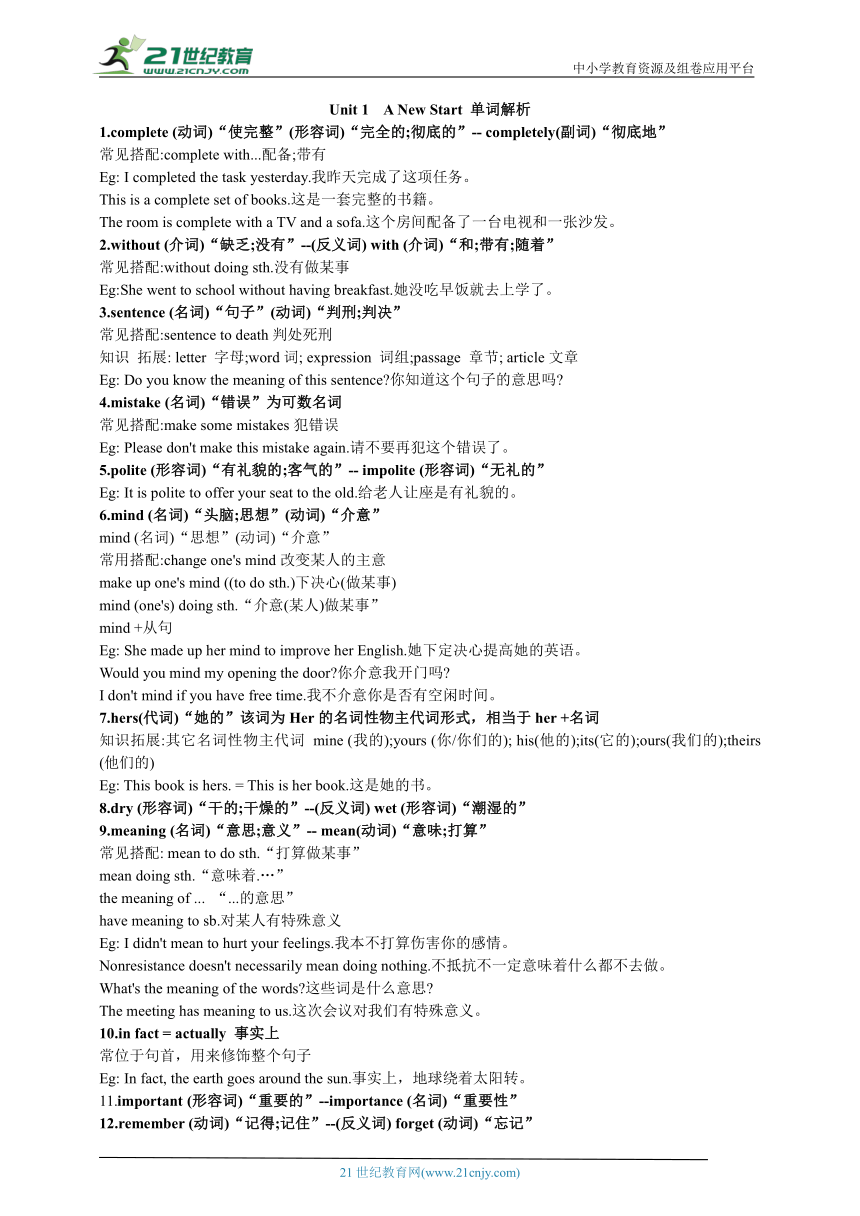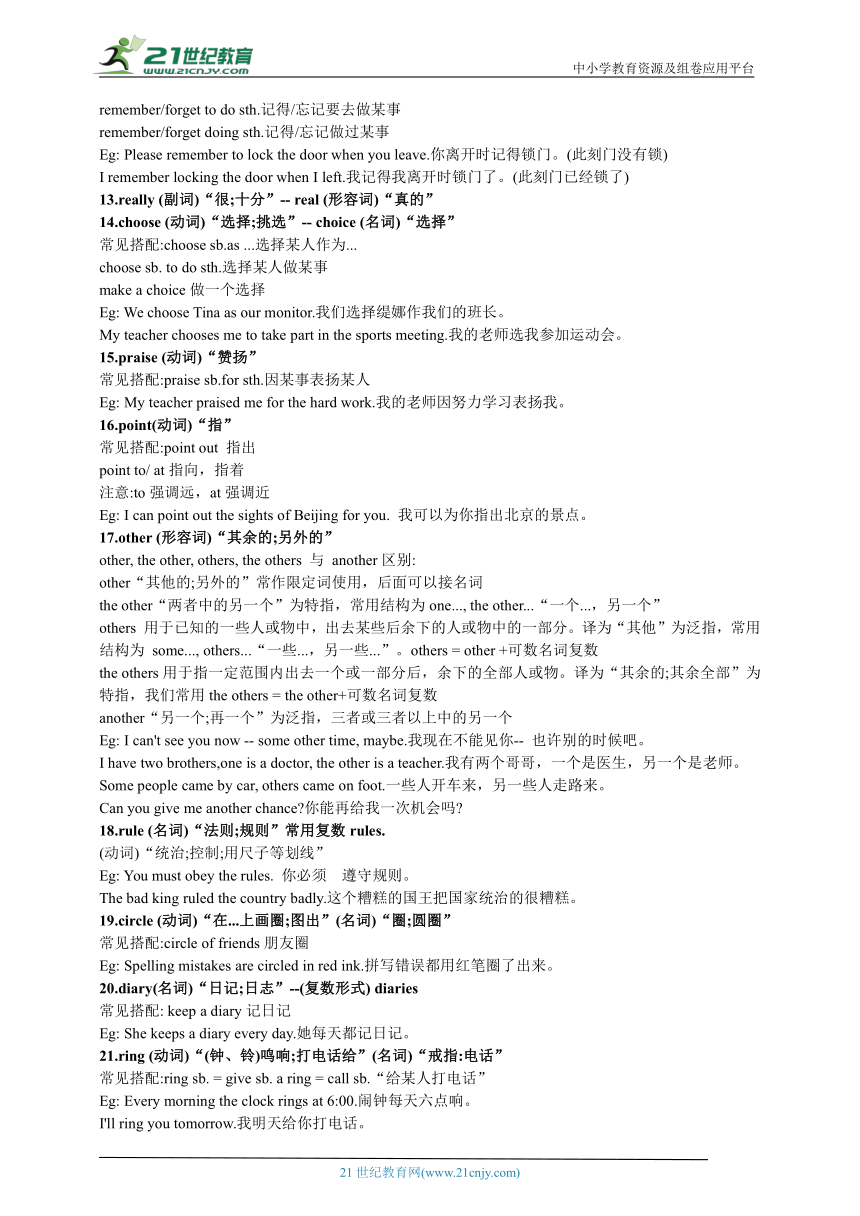Unit 1 A New Start 单词解析讲义(外研版2024七上英语)
文档属性
| 名称 | Unit 1 A New Start 单词解析讲义(外研版2024七上英语) |  | |
| 格式 | doc | ||
| 文件大小 | 406.1KB | ||
| 资源类型 | 试卷 | ||
| 版本资源 | 外研版 | ||
| 科目 | 英语 | ||
| 更新时间 | 2024-07-25 06:42:52 | ||
图片预览


文档简介
中小学教育资源及组卷应用平台
Unit 1 A New Start 单词解析
1.complete (动词)“使完整”(形容词)“完全的;彻底的”-- completely(副词)“彻底地”
常见搭配:complete with...配备;带有
Eg: I completed the task yesterday.我昨天完成了这项任务。
This is a complete set of books.这是一套完整的书籍。
The room is complete with a TV and a sofa.这个房间配备了一台电视和一张沙发。
2.without (介词)“缺乏;没有”--(反义词) with (介词)“和;带有;随着”
常见搭配:without doing sth.没有做某事
Eg:She went to school without having breakfast.她没吃早饭就去上学了。
3.sentence (名词)“句子”(动词)“判刑;判决”
常见搭配:sentence to death判处死刑
知识 拓展: letter 字母;word词; expression 词组;passage 章节; article文章
Eg: Do you know the meaning of this sentence 你知道这个句子的意思吗
4.mistake (名词)“错误”为可数名词
常见搭配:make some mistakes犯错误
Eg: Please don't make this mistake again.请不要再犯这个错误了。
5.polite (形容词)“有礼貌的;客气的”-- impolite (形容词)“无礼的”
Eg: It is polite to offer your seat to the old.给老人让座是有礼貌的。
6.mind (名词)“头脑;思想”(动词)“介意”
mind (名词)“思想”(动词)“介意”
常用搭配:change one's mind改变某人的主意
make up one's mind ((to do sth.)下决心(做某事)
mind (one's) doing sth.“介意(某人)做某事”
mind +从句
Eg: She made up her mind to improve her English.她下定决心提高她的英语。
Would you mind my opening the door 你介意我开门吗
I don't mind if you have free time.我不介意你是否有空闲时间。
7.hers(代词)“她的”该词为Her的名词性物主代词形式,相当于her +名词
知识拓展:其它名词性物主代词 mine (我的);yours (你/你们的); his(他的);its(它的);ours(我们的);theirs (他们的)
Eg: This book is hers. = This is her book.这是她的书。
8.dry (形容词)“干的;干燥的”--(反义词) wet (形容词)“潮湿的”
9.meaning (名词)“意思;意义”-- mean(动词)“意味;打算”
常见搭配: mean to do sth.“打算做某事”
mean doing sth.“意味着.…”
the meaning of ... “...的意思”
have meaning to sb.对某人有特殊意义
Eg: I didn't mean to hurt your feelings.我本不打算伤害你的感情。
Nonresistance doesn't necessarily mean doing nothing.不抵抗不一定意味着什么都不去做。
What's the meaning of the words 这些词是什么意思
The meeting has meaning to us.这次会议对我们有特殊意义。
10.in fact = actually 事实上
常位于句首,用来修饰整个句子
Eg: In fact, the earth goes around the sun.事实上,地球绕着太阳转。
11.important (形容词)“重要的”--importance (名词)“重要性”
12.remember (动词)“记得;记住”--(反义词) forget (动词)“忘记”
remember/forget to do sth.记得/忘记要去做某事
remember/forget doing sth.记得/忘记做过某事
Eg: Please remember to lock the door when you leave.你离开时记得锁门。(此刻门没有锁)
I remember locking the door when I left.我记得我离开时锁门了。(此刻门已经锁了)
13.really (副词)“很;十分”-- real (形容词)“真的”
14.choose (动词)“选择;挑选”-- choice (名词)“选择”
常见搭配:choose sb.as ...选择某人作为...
choose sb. to do sth.选择某人做某事
make a choice做一个选择
Eg: We choose Tina as our monitor.我们选择缇娜作我们的班长。
My teacher chooses me to take part in the sports meeting.我的老师选我参加运动会。
15.praise (动词)“赞扬”
常见搭配:praise sb.for sth.因某事表扬某人
Eg: My teacher praised me for the hard work.我的老师因努力学习表扬我。
16.point(动词)“指”
常见搭配:point out 指出
point to/ at指向,指着
注意:to强调远,at强调近
Eg: I can point out the sights of Beijing for you. 我可以为你指出北京的景点。
17.other (形容词)“其余的;另外的”
other, the other, others, the others 与 another区别:
other“其他的;另外的”常作限定词使用,后面可以接名词
the other“两者中的另一个”为特指,常用结构为one..., the other...“一个...,另一个”
others 用于已知的一些人或物中,出去某些后余下的人或物中的一部分。译为“其他”为泛指,常用结构为 some..., others...“一些...,另一些...”。others = other +可数名词复数
the others用于指一定范围内出去一个或一部分后,余下的全部人或物。译为“其余的;其余全部”为特指,我们常用the others = the other+可数名词复数
another“另一个;再一个”为泛指,三者或三者以上中的另一个
Eg: I can't see you now -- some other time, maybe.我现在不能见你-- 也许别的时候吧。
I have two brothers,one is a doctor, the other is a teacher.我有两个哥哥,一个是医生,另一个是老师。
Some people came by car, others came on foot.一些人开车来,另一些人走路来。
Can you give me another chance 你能再给我一次机会吗
18.rule (名词)“法则;规则”常用复数rules.
(动词)“统治;控制;用尺子等划线”
Eg: You must obey the rules. 你必须 遵守规则。
The bad king ruled the country badly.这个糟糕的国王把国家统治的很糟糕。
19.circle (动词)“在...上画圈;图出”(名词)“圈;圆圈”
常见搭配:circle of friends朋友圈
Eg: Spelling mistakes are circled in red ink.拼写错误都用红笔圈了出来。
20.diary(名词)“日记;日志”--(复数形式) diaries
常见搭配: keep a diary记日记
Eg: She keeps a diary every day.她每天都记日记。
21.ring (动词)“(钟、铃)鸣响;打电话给”(名词)“戒指:电话”
常见搭配:ring sb. = give sb. a ring = call sb.“给某人打电话”
Eg: Every morning the clock rings at 6:00.闹钟每天六点响。
I'll ring you tomorrow.我明天给你打电话。
22.ourselves“我们自己”为反身代词,其单数形式为myself“我自己”
其它反身代词有:yourself(你自己); himself (他自己); herself(她自己); itself(它自己);yourselves(你们自己); themselves(他们自己)
23.smile (名词)“微笑”(动词)“微笑”
常见搭配:smile at sb.对某人微笑
Eg: She always smiles at me.她总是对我微笑。
24.lucky (形容词)“幸运的”-- luck (名词)“幸运”-- luckily(副词)“幸运地”
unlucky (形容词)不幸的;unluckily(副词)不幸地
常见搭配:lucky day 幸运日;lucky dog 幸运儿
Eg: Good luck to you !祝你好运!
Luckily, I found my dog.幸运地是,我找到了我的狗。
It's my lucky day!今天是我的幸运日。
25.until(介词)“直到...为止”
常见搭配:not... until直到...才...
Eg: We will stay here till next week. 我们要在这待到下周。
She didn't go to bed until her mother came back.她直到妈妈回来才去上床睡觉。
26.happen (动词)“发生”一般指偶然发生
take place“发生”指有预谋、有计划地发生
常见搭配: sth.+ happen to sb.某人发生了某事
sth. + happen + 地点/时间某地/某时发生了某事
sb. + happen to do sth.某人碰巧做某事
Eg: What happened to him last month 上个月他发生了什么
She happened to meet her friend yesterday.她昨天碰巧遇见了她的朋友。
The next World Cup will take place in three years' time. 下届世界杯将在三年后举办。
27.during (介词)“在..期间”
知识拓展:during与in的区别:
二者均可表示一段时间,有时可互换。但 during更强调时间的延续;in只是指一般性的某一时间。
Eg: Many people suffered hardship during the war.许多人在战争期间受苦遭难。
He was injured in the war.他在战争期间受伤了。
28.more“更多的;另外的”是many/much的比较级形式
也可以用来修饰多音节形容词的比较级
Eg: I can give you more time.我可以给你更多时间。
She is getting more and more beautiful.她变得越来越漂亮。
29.advice(不可数名词)“建议”,可以用much, a little等词修饰,在表示“一条建议”时用a piece of advice的结构。
advise (动词)“建议”;常见搭配:advise sb. to do sth建议做某事
suggestion (可数名词)“建议”可以用many,a few等词修饰
suggest (动词)“建议”常见搭配:suggest doing sth.建议做某事
suggest后接that从句时,从句动词用原形
Eg: I suggest that you ask for advice.我建议你咨询建议。
She advised me to go there by bus.她建议我坐公交车去那。
30.Journey (名词)“旅行;历程”
知识拓展:Journey, trip, travel与tour区别:
journey着重指“长距离的、陆上的旅行”
trip 指“任何方式的短途旅行”
travel泛指旅行的过程,尤指出国旅行
tour常指“以游览、视察、购物等为目的的旅行”
Eg: Did you have a good journey 你一路顺利吗
31.Of course =Sure = Certainly.当然了。
32.thought (名词)“意见;注意;观点”同时是动词think的过去时及过去分词
Eg: I've just had a thought.我刚想到一个主意。
33.wind (名词)“风”-- windy(形容词)“有风的”
常见搭配: strong wind 强风
Eg: It's windy today.今天多风。
34.wide (形容词)“宽的”-- width (名词)“宽度”
35.pain (名词)“疼痛”--(同义词) ache“疼痛”
常见搭配: in great pain “处于巨大痛苦之中”
No pains, no gains.“不劳无获”
Eg: I have a pain in my head.我头疼。
36.through (介词)“穿过;通过”
go through ... 穿过...
知识拓展:through与across区别:
through 常指从内部穿过而across常指从表面穿过
Eg: I often go home through the park.我经常穿过公园回家。
The old man walked across the street alone.这位老人独自走过过马路。
37.hope (动词)“希望”
常见搭配: hope to do sth. = hope + that 从句
注意: hope没有hope sb. to do sth.结构
Eg: I hope to visit Paris. = I hope that I can visit Paris.我希望参观巴黎。
知识拓展:wish与hope区别
wish 常指难以实现的“希望”后面即可加to do也可加 sb.to do sth.
hope 常指容易实现的“希望”后面只能接to do
Eg: I hope to visit Beijing next month.“我希望下周参观北京。”
My mum wishes me to finish my homework in an hour.“我妈妈希望我一小时后完成作业。”
21世纪教育网 www.21cnjy.com 精品试卷·第 2 页 (共 2 页)
HYPERLINK "http://21世纪教育网(www.21cnjy.com)
" 21世纪教育网(www.21cnjy.com)
Unit 1 A New Start 单词解析
1.complete (动词)“使完整”(形容词)“完全的;彻底的”-- completely(副词)“彻底地”
常见搭配:complete with...配备;带有
Eg: I completed the task yesterday.我昨天完成了这项任务。
This is a complete set of books.这是一套完整的书籍。
The room is complete with a TV and a sofa.这个房间配备了一台电视和一张沙发。
2.without (介词)“缺乏;没有”--(反义词) with (介词)“和;带有;随着”
常见搭配:without doing sth.没有做某事
Eg:She went to school without having breakfast.她没吃早饭就去上学了。
3.sentence (名词)“句子”(动词)“判刑;判决”
常见搭配:sentence to death判处死刑
知识 拓展: letter 字母;word词; expression 词组;passage 章节; article文章
Eg: Do you know the meaning of this sentence 你知道这个句子的意思吗
4.mistake (名词)“错误”为可数名词
常见搭配:make some mistakes犯错误
Eg: Please don't make this mistake again.请不要再犯这个错误了。
5.polite (形容词)“有礼貌的;客气的”-- impolite (形容词)“无礼的”
Eg: It is polite to offer your seat to the old.给老人让座是有礼貌的。
6.mind (名词)“头脑;思想”(动词)“介意”
mind (名词)“思想”(动词)“介意”
常用搭配:change one's mind改变某人的主意
make up one's mind ((to do sth.)下决心(做某事)
mind (one's) doing sth.“介意(某人)做某事”
mind +从句
Eg: She made up her mind to improve her English.她下定决心提高她的英语。
Would you mind my opening the door 你介意我开门吗
I don't mind if you have free time.我不介意你是否有空闲时间。
7.hers(代词)“她的”该词为Her的名词性物主代词形式,相当于her +名词
知识拓展:其它名词性物主代词 mine (我的);yours (你/你们的); his(他的);its(它的);ours(我们的);theirs (他们的)
Eg: This book is hers. = This is her book.这是她的书。
8.dry (形容词)“干的;干燥的”--(反义词) wet (形容词)“潮湿的”
9.meaning (名词)“意思;意义”-- mean(动词)“意味;打算”
常见搭配: mean to do sth.“打算做某事”
mean doing sth.“意味着.…”
the meaning of ... “...的意思”
have meaning to sb.对某人有特殊意义
Eg: I didn't mean to hurt your feelings.我本不打算伤害你的感情。
Nonresistance doesn't necessarily mean doing nothing.不抵抗不一定意味着什么都不去做。
What's the meaning of the words 这些词是什么意思
The meeting has meaning to us.这次会议对我们有特殊意义。
10.in fact = actually 事实上
常位于句首,用来修饰整个句子
Eg: In fact, the earth goes around the sun.事实上,地球绕着太阳转。
11.important (形容词)“重要的”--importance (名词)“重要性”
12.remember (动词)“记得;记住”--(反义词) forget (动词)“忘记”
remember/forget to do sth.记得/忘记要去做某事
remember/forget doing sth.记得/忘记做过某事
Eg: Please remember to lock the door when you leave.你离开时记得锁门。(此刻门没有锁)
I remember locking the door when I left.我记得我离开时锁门了。(此刻门已经锁了)
13.really (副词)“很;十分”-- real (形容词)“真的”
14.choose (动词)“选择;挑选”-- choice (名词)“选择”
常见搭配:choose sb.as ...选择某人作为...
choose sb. to do sth.选择某人做某事
make a choice做一个选择
Eg: We choose Tina as our monitor.我们选择缇娜作我们的班长。
My teacher chooses me to take part in the sports meeting.我的老师选我参加运动会。
15.praise (动词)“赞扬”
常见搭配:praise sb.for sth.因某事表扬某人
Eg: My teacher praised me for the hard work.我的老师因努力学习表扬我。
16.point(动词)“指”
常见搭配:point out 指出
point to/ at指向,指着
注意:to强调远,at强调近
Eg: I can point out the sights of Beijing for you. 我可以为你指出北京的景点。
17.other (形容词)“其余的;另外的”
other, the other, others, the others 与 another区别:
other“其他的;另外的”常作限定词使用,后面可以接名词
the other“两者中的另一个”为特指,常用结构为one..., the other...“一个...,另一个”
others 用于已知的一些人或物中,出去某些后余下的人或物中的一部分。译为“其他”为泛指,常用结构为 some..., others...“一些...,另一些...”。others = other +可数名词复数
the others用于指一定范围内出去一个或一部分后,余下的全部人或物。译为“其余的;其余全部”为特指,我们常用the others = the other+可数名词复数
another“另一个;再一个”为泛指,三者或三者以上中的另一个
Eg: I can't see you now -- some other time, maybe.我现在不能见你-- 也许别的时候吧。
I have two brothers,one is a doctor, the other is a teacher.我有两个哥哥,一个是医生,另一个是老师。
Some people came by car, others came on foot.一些人开车来,另一些人走路来。
Can you give me another chance 你能再给我一次机会吗
18.rule (名词)“法则;规则”常用复数rules.
(动词)“统治;控制;用尺子等划线”
Eg: You must obey the rules. 你必须 遵守规则。
The bad king ruled the country badly.这个糟糕的国王把国家统治的很糟糕。
19.circle (动词)“在...上画圈;图出”(名词)“圈;圆圈”
常见搭配:circle of friends朋友圈
Eg: Spelling mistakes are circled in red ink.拼写错误都用红笔圈了出来。
20.diary(名词)“日记;日志”--(复数形式) diaries
常见搭配: keep a diary记日记
Eg: She keeps a diary every day.她每天都记日记。
21.ring (动词)“(钟、铃)鸣响;打电话给”(名词)“戒指:电话”
常见搭配:ring sb. = give sb. a ring = call sb.“给某人打电话”
Eg: Every morning the clock rings at 6:00.闹钟每天六点响。
I'll ring you tomorrow.我明天给你打电话。
22.ourselves“我们自己”为反身代词,其单数形式为myself“我自己”
其它反身代词有:yourself(你自己); himself (他自己); herself(她自己); itself(它自己);yourselves(你们自己); themselves(他们自己)
23.smile (名词)“微笑”(动词)“微笑”
常见搭配:smile at sb.对某人微笑
Eg: She always smiles at me.她总是对我微笑。
24.lucky (形容词)“幸运的”-- luck (名词)“幸运”-- luckily(副词)“幸运地”
unlucky (形容词)不幸的;unluckily(副词)不幸地
常见搭配:lucky day 幸运日;lucky dog 幸运儿
Eg: Good luck to you !祝你好运!
Luckily, I found my dog.幸运地是,我找到了我的狗。
It's my lucky day!今天是我的幸运日。
25.until(介词)“直到...为止”
常见搭配:not... until直到...才...
Eg: We will stay here till next week. 我们要在这待到下周。
She didn't go to bed until her mother came back.她直到妈妈回来才去上床睡觉。
26.happen (动词)“发生”一般指偶然发生
take place“发生”指有预谋、有计划地发生
常见搭配: sth.+ happen to sb.某人发生了某事
sth. + happen + 地点/时间某地/某时发生了某事
sb. + happen to do sth.某人碰巧做某事
Eg: What happened to him last month 上个月他发生了什么
She happened to meet her friend yesterday.她昨天碰巧遇见了她的朋友。
The next World Cup will take place in three years' time. 下届世界杯将在三年后举办。
27.during (介词)“在..期间”
知识拓展:during与in的区别:
二者均可表示一段时间,有时可互换。但 during更强调时间的延续;in只是指一般性的某一时间。
Eg: Many people suffered hardship during the war.许多人在战争期间受苦遭难。
He was injured in the war.他在战争期间受伤了。
28.more“更多的;另外的”是many/much的比较级形式
也可以用来修饰多音节形容词的比较级
Eg: I can give you more time.我可以给你更多时间。
She is getting more and more beautiful.她变得越来越漂亮。
29.advice(不可数名词)“建议”,可以用much, a little等词修饰,在表示“一条建议”时用a piece of advice的结构。
advise (动词)“建议”;常见搭配:advise sb. to do sth建议做某事
suggestion (可数名词)“建议”可以用many,a few等词修饰
suggest (动词)“建议”常见搭配:suggest doing sth.建议做某事
suggest后接that从句时,从句动词用原形
Eg: I suggest that you ask for advice.我建议你咨询建议。
She advised me to go there by bus.她建议我坐公交车去那。
30.Journey (名词)“旅行;历程”
知识拓展:Journey, trip, travel与tour区别:
journey着重指“长距离的、陆上的旅行”
trip 指“任何方式的短途旅行”
travel泛指旅行的过程,尤指出国旅行
tour常指“以游览、视察、购物等为目的的旅行”
Eg: Did you have a good journey 你一路顺利吗
31.Of course =Sure = Certainly.当然了。
32.thought (名词)“意见;注意;观点”同时是动词think的过去时及过去分词
Eg: I've just had a thought.我刚想到一个主意。
33.wind (名词)“风”-- windy(形容词)“有风的”
常见搭配: strong wind 强风
Eg: It's windy today.今天多风。
34.wide (形容词)“宽的”-- width (名词)“宽度”
35.pain (名词)“疼痛”--(同义词) ache“疼痛”
常见搭配: in great pain “处于巨大痛苦之中”
No pains, no gains.“不劳无获”
Eg: I have a pain in my head.我头疼。
36.through (介词)“穿过;通过”
go through ... 穿过...
知识拓展:through与across区别:
through 常指从内部穿过而across常指从表面穿过
Eg: I often go home through the park.我经常穿过公园回家。
The old man walked across the street alone.这位老人独自走过过马路。
37.hope (动词)“希望”
常见搭配: hope to do sth. = hope + that 从句
注意: hope没有hope sb. to do sth.结构
Eg: I hope to visit Paris. = I hope that I can visit Paris.我希望参观巴黎。
知识拓展:wish与hope区别
wish 常指难以实现的“希望”后面即可加to do也可加 sb.to do sth.
hope 常指容易实现的“希望”后面只能接to do
Eg: I hope to visit Beijing next month.“我希望下周参观北京。”
My mum wishes me to finish my homework in an hour.“我妈妈希望我一小时后完成作业。”
21世纪教育网 www.21cnjy.com 精品试卷·第 2 页 (共 2 页)
HYPERLINK "http://21世纪教育网(www.21cnjy.com)
" 21世纪教育网(www.21cnjy.com)
同课章节目录
